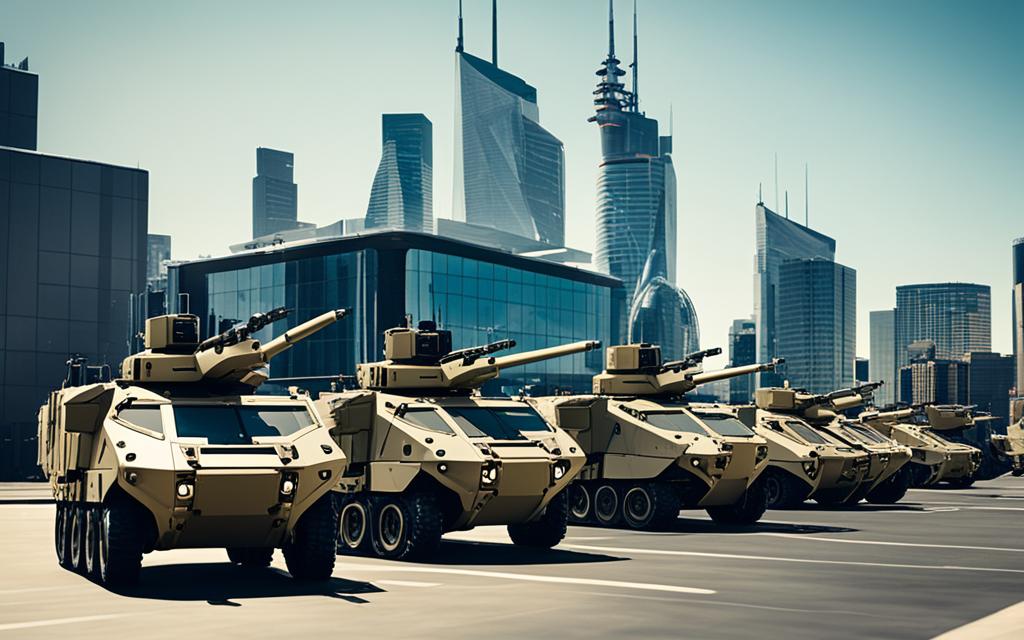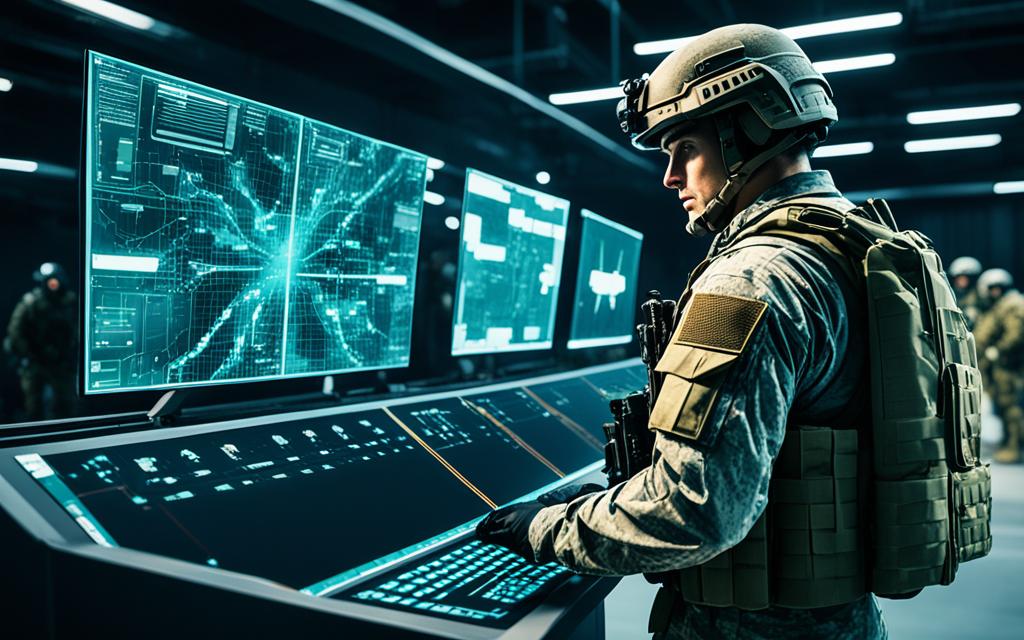Are we entering a new age of warfare or opening a risky Pandora’s box? Artificial intelligence (AI) is changing military tactics in big ways. Yet, it raises a big question: how dangerous is it to add AI to our armed forces?
Military AI is growing fast, from drones to smart data tools. These tech advances could make operations more efficient and effective. But do they justify the moral and safety concerns they bring?
In this piece, we will tackle the debate around AI in military uses. We’ll look at the worries people have. Then, we’ll examine how AI could both benefit and risk our defense strategies.
Key Takeaways
- The use of AI in military tasks is expanding quickly.
- AI can improve efficiency and success but also raises ethical and safety issues.
- Examining the benefits and drawbacks of military AI is crucial.
- It’s important to make sure AI in the military is used ethically.
- The future of AI in defense depends on balancing innovation and responsibility.
The Evolution of AI in the Military
The path of artificial intelligence (AI) in the military is both exciting and game-changing. It started in research labs and has grown to be part of defense systems. Let’s explore the rich history, the latest trends, and what pushes armies to use AI.
Historical Background
AI in the military began with early computer projects in the mid-20th century. It started with simple tasks and data work. During the Cold War, the race for supremacy spurred AI research, leading to the first automated systems. Over years, the joint effort of colleges and groups like DARPA pushed military AI forward.
Current Trends
Now, AI is changing how wars are fought. Technologies range from spying drones to AI in cybersecurity. Leading nations, including the US, China, and Russia, are investing heavily in AI for defense. This investment is boosting smart logistics, equipment upkeep, and better training for troops.
Main Drivers of AI Adoption
Many reasons push armies to adopt AI. One big reason is efficiency; AI handles data better and makes fewer mistakes than people. Fighting for an AI advantage keeps nations ahead in modern warfare. Lastly, new challenges like cyber attacks need AI for a strong defense.
Autonomous Weapon Systems: A Double-Edged Sword
Autonomous weapon systems mark a major tech leap, offering pros and cons. They can decide in battle without human help. This could mean more efficiency and quicker moves in conflicts.

But, the downside is worrisome, focusing on AI risk in armed forces. The thought of machines choosing life or death on their own raises big ethical issues. Critics point out that the debate over lethal autonomous weapons controversy is clear. The systems could fail or be hacked, leading to major disasters.
There are deep ethical issues, including the absence of accountability and moral thinking in AI. Without people in control, using autonomous weapon systems could break international laws. This brings up who is responsible when things go wrong.
Still, supporters believe in the benefits these systems offer. They suggest that autonomous systems could protect human lives by being on the front lines. In the end, using these technologies involves balancing tech advances and ethical challenges carefully.
AI Warfare: Changing the Landscape of Combat
The rise of AI warfare is changing how countries handle fights. By using advanced algorithms and real-time data, AI is making battle plans and tactics more precise. Old battle methods are being updated for this new tech, bringing about a era that values speed, efficiency, and accuracy.
Impact on Strategy and Tactics
AI is having a big effect on battle strategy. It lets military leaders run a lot of different scenarios and see outcomes more clearly. For example, machine learning can quickly go through lots of battlefield data and give important advice fast. This helps commanders use their resources better and predict enemy moves with amazing accuracy. AI also lets us create systems that can do complex tasks on their own, making our forces more flexible.
AI also helps armies change their plans quickly during fights. AI systems can take in new information and adjust plans right away. This means our forces always have the upper hand. By using AI, armies can fight in smarter, more effective ways, greatly boosting their success.
Case Studies of AI in Action
There are many stories of how AI is changing warfare. For instance, the U.S. military uses AI drones in combat zones to get a better view of the battlefield. These drones can spot and follow targets with their smart cameras, giving troops very useful information.
AI is also being used to protect against cyber attacks. NATO has started using AI to quickly spot and stop cyber threats, keeping their most important systems safe. These AI defenses work really well, showing how important AI is for keeping our country safe.
AI and human teams are also working together in new ways. In a training exercise, AI helped simulate enemy tactics, giving soldiers a better challenge. This team-up not only gets troops ready for real battles but also makes AI smarter by learning from the experience.
Putting AI into military plans is a big change, making forces work better and adapt faster. As AI keeps getting better, its role in warfare will only become more important. This signals a new age of conflict where human smarts are boosted by AI.
Ethical Concerns of Military AI
The use of AI in the military brings up big ethical questions. One key issue is the use of lethal autonomous weapons. These can make critical decisions without people, raising concerns about morality in warfare.

Some believe these technologies might lower the death toll for humans and make fighting more precise. However, we can’t ignore the risks of misuse and how it makes war less human. The discussion around deadly autonomous weapons shows why strict global rules and moral guides are essential.
Let’s look closer at the ethical worries:
- Risk of Accountability: Figuring out who’s to blame if an autonomous weapon fails.
- Human Oversight: Making sure there’s a moral check on these machines.
- International Humanitarian Law: Fitting AI into laws that protect during wars.
These concerns highlight the need for worldwide talks to make norms and rules. This is vital as we grow with technology. We must keep innovation in line with ethics to protect what we all value.
For a deeper dive into the big ethical questions, here’s a table:
| Concern | Description | Implications |
|---|---|---|
| Accountability | Figuring out who’s responsible when AI systems go wrong. | Issues with laws and the chance of not addressing misuse. |
| Human Oversight | The need for human input in AI’s decision-making. | Guarantees decisions follow ethical and moral principles. |
| International Humanitarian Law | Following laws that ensure human rights in war. | Keeps treatment humane and stops illegal acts in battles. |
AI-Powered Defense and National Security
We’re exploring AI’s role in boosting national security. We see many promising advantages but also face new risks.
Benefits to National Security
AI defense systems boost our security. They make response times faster and intelligence more precise. With data analysis, AI spots threats earlier and more accurately than old methods. This strengthens our national defense.
AI also helps keep our gear ready to go by spotting possible breakdowns before they happen. It sorts through lots of data, catching true threats quickly.
Potential Threats and Responses
Even with its benefits, AI in defense poses some risks. Adversarial attacks are a big worry. They trick AI systems, which could lead to big problems. To fight this, we need strong AI defense plans. These include updating systems often and protecting algorithms.
AI could also play a role in cyber warfare. Countries must have solid cyber defense strategies and be ready to react to attacks. Making international defensive agreements can help protect us all from AI threats.
| Aspect | Benefits | Threats | Responses |
|---|---|---|---|
| Surveillance | Enhanced threat detection | Risk of data manipulation | Implementing robust encryption |
| Predict with ive Maintenance | Reduced downtime | System disruptions | Routine algorithm updates |
| Cybersecurity | Proactive defense | Adversarial attacks | International collaboration |
Machine Learning and Neural Networks in Combat
The use of machine learning for defense is changing warfare in big ways. It’s making operations better by improving weapon accuracy and making information processing faster. This tech is turning battlefields into places of high-tech action.
At the heart of this change are neural networks in combat. They sift through huge data chunks quickly. This lets them target with more accuracy and make decisions faster. By learning from a lot of data, military AI can spot patterns and see threats we’d miss.
Now, let’s look at how things compare:
| Aspect | Traditional Systems | AI Combat Systems |
|---|---|---|
| Weapon Accuracy | Moderate | High |
| Information Processing Speed | Slow | Fast |
| Decision-Making | Human-Dependent | Automated |
| Data Analysis | Limited | Advanced |
| Predictive Capabilities | Low | High |
The growth of AI combat systems has led to smart drones and robots. They can do tough tasks with little help from humans. This doesn’t just make work smooth. It also keeps soldiers safe by using AI in dangerous places.
The mix of machine learning and neural networks in combat is redefining warfare. It changes old tactics and gives us a big advantage over enemies. As AI keeps getting better, it will play a bigger role in defense, leading to more military breakthroughs.
Dangerous? Artificial intelligence in the military
Using AI in the military offers advanced functions but raises major concerns too. It’s key to know the dangers of military AI for safe and balanced defense strategies.
Risks Involved
AI military risks are wide-ranging. They include unexpected errors, the chance of hacking, and ethical issues. AI systems could wrongly act in crucial times due to glitches.
These high-tech systems also face hacking threats, leading to unauthorized use or shutdown. Ethical debates arise over AI making choices without understanding human morals or context. Such decisions might end up harming people severely.
How to Mitigate These Risks
To lower these risks, thorough tests and checks are a must. This preps AI systems for safe real-world use. Adding constant monitoring and human input helps manage errors and autonomous decisions.
Boosting cybersecurity is critical to defend against hackers. Strong encryption and defense tactics are necessary for safety. Building a global ethical standard for military AI guides correct and fair use.
Future Prospects of AI in Military Operations
The future of military AI is exciting. It promises to change defense strategies across the globe. With new tech, military operations will get innovative tools and systems. These will offer huge strategic benefits.
Innovations on the Horizon
Many AI developments are on their way to improving defense. Autonomous drones will analyze data in real-time. AI will also beef up cyber defense. These technologies aim to make military operations more effective. They will help in hitting targets more accurately, using resources better, and making quicker decisions during conflict.
Long-term Implications
The impact of military AI will stretch beyond tactics. It will affect global security as a whole. Advanced AI systems might kick off a race for technological dominance. Countries will try to outdo each other with tech. This push for better AI technology highlights the need for countries to work together. It’s important to manage risks and use AI in the military responsibly.
| Aspect | Potential Benefits | Possible Challenges |
|---|---|---|
| Operational Efficiency | Improved resource allocation and faster decision-making | Ensuring AI accuracy and reliability |
| Strategic Advantages | Advanced targeting and data analysis capabilities | Maintaining a competitive edge in the tech race |
| Global Security | Enhanced defense mechanisms and threat detection | Potential for an AI-driven arms race |
Conclusion
In the world of Artificial intelligence in the military, we see both hope and worry. The use of advanced tech like autonomous weapons brings excitement. Yet, it also brings ethical questions and big risks.
Exploring military AI shows us how it could change how battles are fought. Technologies like machine learning have changed modern warfare. But, we can’t ignore the dangers of autonomous weapons. These include accidental conflicts and ethical issues.
Discussing military AI ethics is very important. Defense departments must manage risks well and follow international laws. This balance between tech advances and moral duty is key. It helps keep the risky side of AI in check. While AI’s benefits in the military are significant, being careful in how we use it is crucial.
